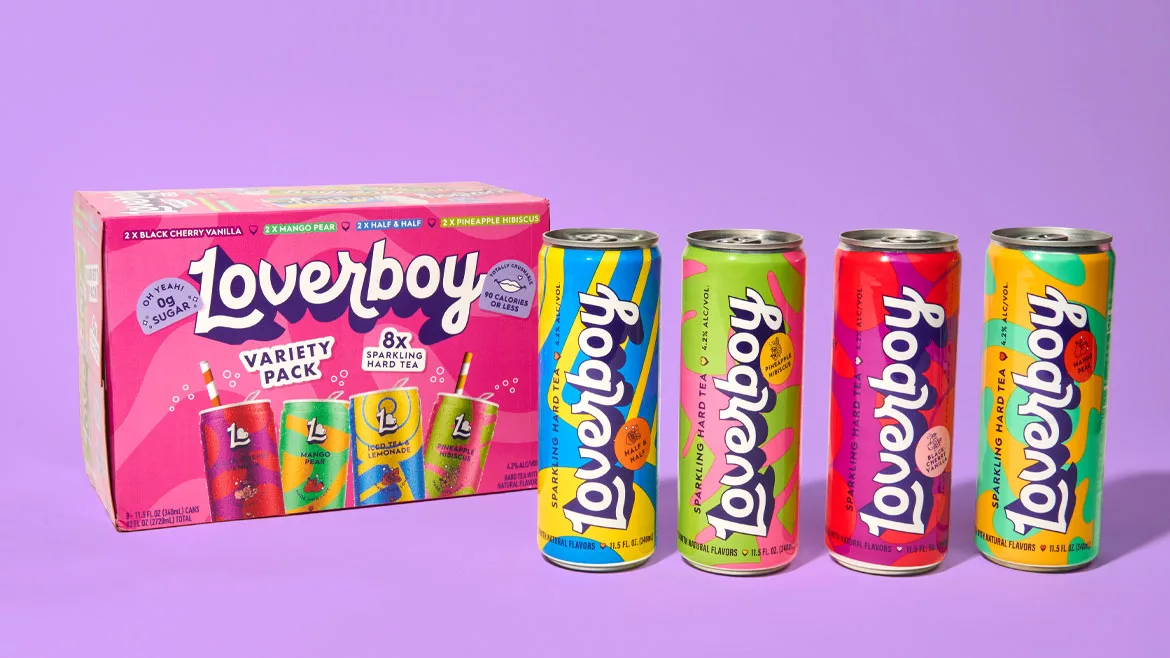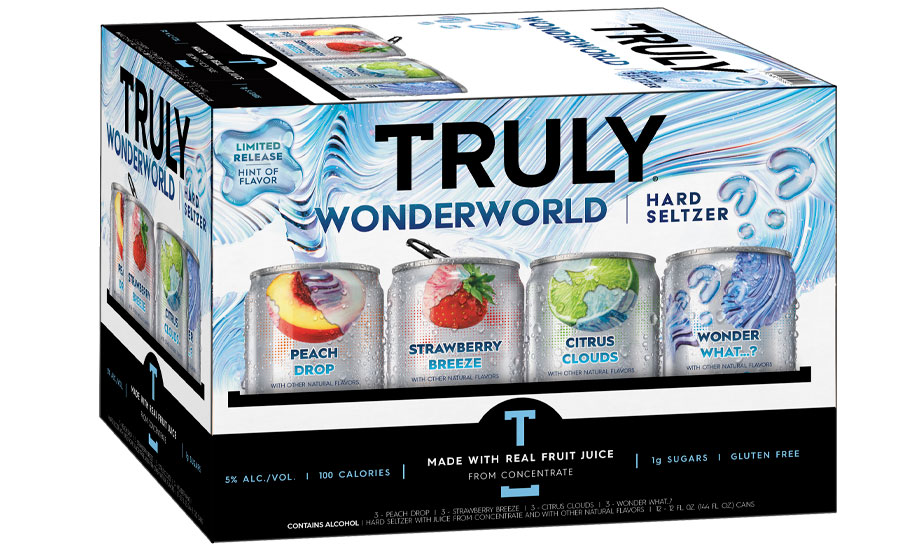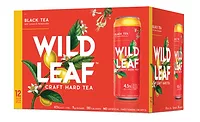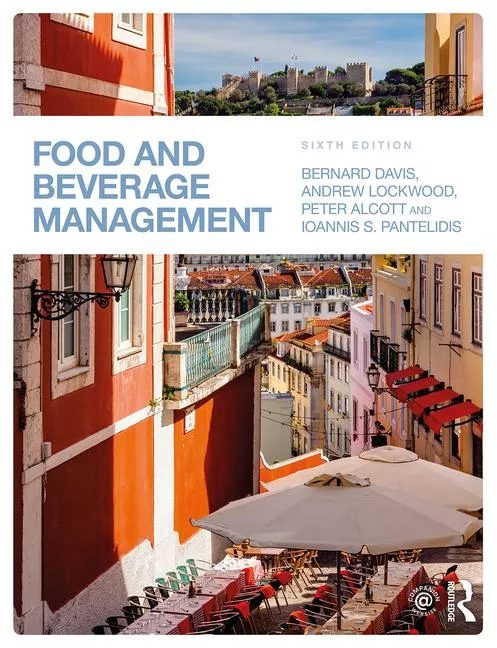2023 Beer Report | Hard teas shine in flavored malt beverage segment
Beyond beer sees preference changes from consumers

Image courtesy of Loverboy
In the episode “Doug’s Last Birthday” of “Disney’s Doug,” an extension of the Nickelodeon’s “Doug,” the title character Doug Funnie laments all the changes taking place in his town and his friends leading up to their first day of middle school. Despite his reservations, Doug realizes the positives that can happen when one is open to change. U.S. beer consumers also are showing their openness to change as they explore the beyond beer segments.
Due to a number of factors, hard seltzers were embraced by U.S. consumers, particularly the beer centric seltzers. However, beer centric seltzers have begun to contract with case sales down 15% and dollar sales down 10.4%, totaling $4.1 billion, for the 52 weeks ending Jan. 1 in total U.S. multi-outlets, according to Chicago-based Information Resources Inc. (IRI).
Although hard seltzers might be in decline, beyond beer is not falling out of favor with consumers as flavored malt beverages (FMBs) showed strong growth in 2022. Case sales were up 8.5% while dollar sales were up 15.2%, totaling $3.7 billion, according to IRI data.
“Hard seltzers have actually been declining for the past nine to 12 months while other platforms such as hard teas, traditional FMBs, and premixed cocktails have performed well and contributed highly to overall segment growth,” says Scott Scanlon, executive vice president of BevAl Vertical at IRI. “The notable exception with regard to seltzers is spirits-based seltzers which have been achieving near triple-digit growth over the past year.”
Despite hard seltzers decline, companies remain committed to listening to consumers and delivering what they want and need from the segment. For example, Truly Hard Seltzer, a brand of The Boston Beer Co., Boston, announced earlier this year that it will refresh the brand to sustain consumer interest in hard seltzers as it works to grow Truly’s share and increase its No. 2 position within a crowded category.
“Truly helped establish hard seltzer as we know it today, but we recognize the segment is evolving for the drinker of tomorrow,” said Boston Beer Company CEO Dave Burwick, in a statement. “As hard seltzer enters the post-hype era, we are strategically investing in new marketing and packaging to keep Truly top of mind and remind drinkers why they came to the category in the first place.”
The brand is redesigning its packaging to make the portfolio easier to find for drinkers with a more visually consistent look and clearer communication that it is now more refreshing and made with real fruit juice from concentrate.
Additionally, following three straight years of introducing bold flavors, the brand will shift focus back to its lightly flavored core and introduce rotating trimester seasonals that are lightly flavored and made with real fruit juice from concentrate. And, following the success of Truly’s second holiday cocktail-inspired mix pack and 2022’s Poolside mix pack, Truly will launch limited-release packs each trimester in 2023, with Wonderworld as the initial release.
An area that has taken off within beyond beers is hard teas.

Image courtesy of The Boston Beer Co.
“Hard teas were the winner in 2022 lead by Twisted Tea up in the high double digits,” says Brian Sudano, managing partner at New York-based Beverage Marketing Corporation (BMC). “Hard seltzer overall was down modestly with White Claw flat to up slightly while Truly declined in double digits. Others such as Simply in FMBs and Topo Chico were positive contributors to segment growth.”
Given the success of Twisted Tea, Sudano adds that hard teas have received a lot of attention from consumers and ultimately is seeing more competitors enter the space.
New York-based Loverboy, a premium alcohol brand, is best known for its sparkling hard teas, spritzes and martini canned cocktails. This past fall, the company introduced four new sparkling hard tea flavors now available in its first-ever eight-can variety pack. The new flavors, Mango Pear, Pineapple Hibiscus, Half Tea & Half Lemonade, and Black Cherry Vanilla, are all made with organic brewed tea and are gluten free, 90 calories or less and contain zero grams of sugar, like all Loverboy hard tea flavors.
“Our fans have been asking for new flavors and we wanted to deliver in a big way, so we took the time we needed to get it right, and nailed it,” said Kyle Cooke, founder and CEO of Loverboy, in a statement at the time of the launch. “Our fans like to switch back and forth among Loverboy flavors, so we decided to give them four bold new flavors that can seamlessly work into their repertoire and easily transition from summer to fall. Plus, as the first release in Loverboy’s new, bolder package design, consumers won’t be able to miss it on shelves.”
Flavorful approach
As FMBs prominence grows, analysts note that dedication for the innovators to new, exciting flavors will help fuel the interest in the segment.
“FMBs continue to expand with new flavors and products grabbing drinkers’ attention,” says Grace Wood, senior analyst at New York-based IBISWorld.
Wood notes that demand for fruit and citrus flavors, like pineapple and passionfruit, are driving innovation in FMBs.
Jon Berg, vice president of Beverage Alcohol Thought Leadership at Chicago-based NielsenIQ, also spotlights the role that flavor plays in the FMB market.
“The U.S. is very flavor orientated with a predominant sweet profile well received with most innovations,” he says. “Bitter and savory also have a place in the product mix.”
IRI’s Scanlon adds that Iced Tea, Black Cherry, Margarita, Lemonade and Mango are the top flavors within FMBs, so it is likely that entrepreneurs will offer a combinatory of these when coming to market.
However, flavor is not the only way that FMB companies are innovating for consumers’ needs.
“We also expect proven brands to offer multiple sizes if they are not already doing so to further capitalize on different usage occasions,” Scanlon says. “We also expect increased focus on simple and natural ingredients to appeal to consumer desire for healthier indulgence and transparency within the overall Bev Al category.”
This comes as convenience, variety and formulation consistency influence much of the innovation surrounding FMBs.
“Most manufacturers are using a dual strategy of expanding singles in small format to capitalize on grab-n-go occasions while introducing new or limited offerings within larger variety packs to increase trial and simultaneously build brand equity,” Scanlon says. “Additionally, formulation consistency has proven effective in appealing to consumers who seek a quality mixed cocktail conveniently packaged in a single-serve can or bottle, thus removing the need to purchase ingredients separately and mix themselves.”
BMC’s Sudano adds that 2023 is likely to see more FMBs touting zero sugar attributes.
Whether it’s hard seltzers, hard teas or more traditional FMBs, beyond beer looks to be embracing change in the name of consumers.
Looking for a reprint of this article?
From high-res PDFs to custom plaques, order your copy today!








